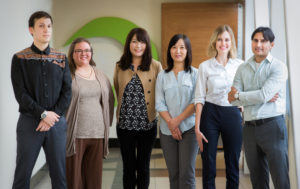CPH grads seek to serve the underserved at JPS
September 7, 2017 • Uncategorized

A team of UNTHSC public health graduates is working toward improved patient outcomes in treatment and prevention of cancer, diabetes, infectious diseases like HIV and Hepatitis C, and maternal/child health.
Rohit Ojha, DrPH (CPH ’10), was recruited last year to establish the new JPS Health Network’s Center for Outcomes Research (COR) and serve as Director.
Along with biostatistician Bradford Jackson, PhD (CPH ’12), and a team of research faculty and staff – including four new CPH graduates who were recently hired in data analyst and epidemiologist positions – they are studying the clinical, lifestyle and behavioral factors that can impact health outcomes of underserved populations.
The goal is to build a healthier community for individuals and families across the JPS service area.
After completing a postdoctoral fellowship with the Dana-Farber Cancer Institute/Harvard Cancer Center in Boston and working as research faculty in the Department of Epidemiology and Cancer Control at St. Jude Children’s Research Hospital in Memphis, Dr. Ojha saw the opportunity to return to Tarrant County as a chance to make a difference in the community’s health.
“By looking at health disparities related to socioeconomic status and other challenges in access to care, we hope to identify factors where we can intervene to reduce disparities in the outcomes of diseases,” Dr. Ojha said.
Working with Tarrant County Public Health and Cook Children’s Medical Center, the COR team also collaborates with UNTHSC and is developing an internship program for epidemiology and biostatistics graduate students.
Dr. Jackson, who previously worked on cancer, chronic disease, radiology projects and clinical trials as an Assistant Professor at the University of Alabama at Birmingham’s Division of Preventive Medicine, calls his role with JPS “a bit of detective work.”
“It’s common for biostatisticians and epidemiologists to wear many hats. My task is to be both consultant and data analyst, to uncover gaps and find answers to questions,” he said. “The research path can identify where certain population groups are not being reached effectively and potentially lead us to new programs and processes for improving care.”
Both Jackson and Ojha feel that the best advice they can offer students planning a career in public health, health research and health care professions is to get as much experience as possible while still in school.
“One thing that worked for me was taking initiative. I tried to get involved in as much as I could. I was fortunate to participate in the design and analysis of diverse studies as a student, which continues to impact my work today,” Dr. Ojha said.
“The million dollar question of what you want to do after you graduate is a difficult one to answer,” Dr. Jackson said. “To better inform your decision, get as much hands-on experience as you can; assisting faculty in their research will provide you with valuable insight. Keep an open mind and learn as much as you can.”


Social media